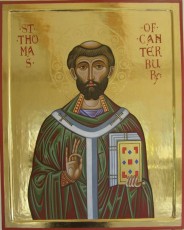Catholic Blesseds, Saints, Solemnities & Holy Days

Saint Thomas Becket
Feast Day: December 29
Patronage: Exeter College – Oxford, Arbroath Abbey, Secular Clergy
St. Thomas Becket is also known as St. Thomas of Canterbury. He was born 1118, and died December 29, 1170. He was the Archbishop of Canterbury from 1162 until he was murdered in 1170. He is noted for engaging in conflict with Henry II of England over the rights and privileges of the Church and was murdered by followers of the King in the Canterbury Cathedral.
He was born in Cheapside, London, on December 21. At the age of 10, he was a student at Merton Priory in England, and later attended a grammar school in London. He later spent a year in Paris around the age of 20. He also studied canon law during this time. With his fathers business failing, he acquired a position working for Theobald of Bec, who soon became the Archbishop of Canterbury. Theobald entrusted him with several important missions to Rome and also sent him to Bologna and Auxerre to study cannon law. He then named Thomas Archdeacon of Canterbury, and other ecclesiastical offices. He was so good in these posts that it led to Theobald recommending him to King Henry II for the vacant post of Lord Chancellor. He was appointed to that position.
As Chancellor, Thomas enforced the King’s traditional sources of revenue that were extracted from all landowners, including churches and Bishops. King Henry even sent his son Henry to live in Thomas’s household. The young Henry said that Thomas Becket showed him more fatherly love in a day than his father did for his entire life. Thomas was nominated as Archbishop of Canterbury in 1162, several months after the death of Theobald. It was the hope of King Henry that Thomas would continue to put the royal government first, rather than that of the Church. It was at this time that Thomas began his transformation into an ascetic.
Thomas Becket was ordained a Priest on June 2, 1162 at Canterbury, and on June 3, 1162 consecrated as Archbishop. A rift quickly grew between Henry and Thomas, as the new archbishop resinged his chancellorship and sought to recover and extend the rights of the archbishopric. This led to a series of conflicts with the king including that over the jurisdiction of secular courts over English clergymen. The king attempted to influence other Bishops against Becket as well.
In 1170, the Young Henry was crowned King of York by the Archbishop of York, along with the Bishop of London, and the Bishop of Salisbury. This was a breach of Canterbury’s privilege of coronation, and in November 1170, Thomas Becket excommunicated all three of them. While the three clergymen fled to the King of Normandy. Thomas continued to excommunicate his opponents in the Church, and the news eventually reached Henry.
Upon hearing the reports of Becket’s actions, Henry uttered words that were interpreted by his men as wishing Becket killed. The words were, “Will no one rid me of this turbulent Priest”? Whatever it was the Henry said, it was interpreted as a royal command, and four knights set out to confront the Archbishop of Canterbury. On December 29, 1170, they arrived at Canterbury. They placed their weapons under a tree outside the Cathedral and hid their armour under their cloaks before entering to challenge Becket. They told Becket that he was to go to Winchester to give an account of his actions, but Becket refused. It was not until Becket refused their demands to submit to the King’s will, that they retrieved their weapons and rushed back inside to kill him. In the meantime, Becket proceeded to the main hall for vespers. The four knights, with drawn swords, caught up with him in a spot near a door to the Monastic Cloister, where the monks were chanting vespers. They killed St. Thomas Becket on the floor of the Cathedral.
Practical Take Away
St. Thomas Becket is also known as St. Thomas of Canterbury. He was born 1118, and died December 29, 1170. He was the Archbishop of Canterbury from 1162 until he was murdered in 1170. He is noted for engaging in conflict with Henry II of England over the rights and privileges of the Church and was murdered by followers of the King in the Canterbury Cathedral. He was killed by four Knights of the Young King Henry of York, on the floor of the Canterbury Cathedral.





